4+ AAC Tips for Talking About Past Events- July 4th
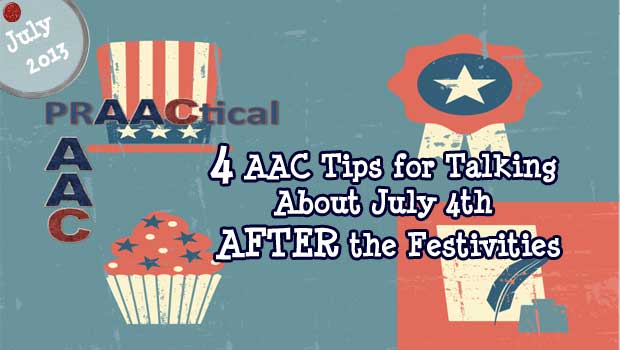
- Make a Plan – Schedule a time to ‘talk about the past event (July 4th). The plan can include a ‘talk time’ or a time to collect remnants, photos, or related items from the event. Use a calendar or schedule to plan AAC style.
- Put Together A ‘Talking’ Photo Album– Gather all the photos from the activity and put together a talking photo album. You can use any talking photo album where you record a voice or use a story creation app that has recorded (digitized) or computer generated speech (synthesized). The process of making the photo album can be the ‘past event’ conversation and/or a review/reading can be the ‘conversation’. For some learners, turning the pages is the beginning of talking about past events while for other learners the pictures will be the opportunity for the conversation. It is helpful to use text and speech as you create the photo album and tell the story from the perspective of the learner. Then set up routines where the photo album can be used to initiate the topic of July 4th. The routine may involve making the photo album, putting it into a special place, getting it out and inviting others to look and listen. The routine will expand and become a tradition in and of itself the more you prAACtice making ‘past event’ conversation photo albums.
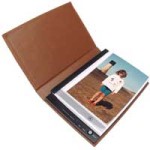
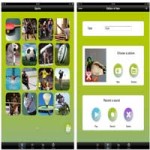
- Write a Book- Write about your July 4th celebrations (or mishaps). Write about the day in book form. Draw, sketch, cut out pictures to go withthe story.The story can
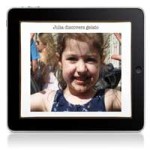 be true or fantasy depending upon interest, structured choices, or preferences. Feel free to write about any holiday ‘disasters’ if that was what was most meaningful to the learner. Make the story interesting and fun. But it is also great to write about not liking the activity because those ideas and emotions are as important or even more important then the ‘perfect’ situation. Use humor in the books if that is what makes sense. The story should have impact so the learner wants to read it again and again even if you need to help them want to read it again through routines, modeling, or repeated exposures. Sometimes the repeated exposures begin with just holding the book, then reading just the title, then reading a page, until you can read the whole book together and you find the learner requesting the book. This may take 1 or 1000 times but don’t give up because the fun and excitement at the first request is definitely worth it.
be true or fantasy depending upon interest, structured choices, or preferences. Feel free to write about any holiday ‘disasters’ if that was what was most meaningful to the learner. Make the story interesting and fun. But it is also great to write about not liking the activity because those ideas and emotions are as important or even more important then the ‘perfect’ situation. Use humor in the books if that is what makes sense. The story should have impact so the learner wants to read it again and again even if you need to help them want to read it again through routines, modeling, or repeated exposures. Sometimes the repeated exposures begin with just holding the book, then reading just the title, then reading a page, until you can read the whole book together and you find the learner requesting the book. This may take 1 or 1000 times but don’t give up because the fun and excitement at the first request is definitely worth it. - Create Conversation Cards– Use cards or a series of cards on a key ring to have conversational starters, partner focused questions, conversation extenders and teach the learner to use them to initiate, maintain, and extend conversations. And for some learners, make sure to put a conversational end so it is clear when to terminate the conversation. Use communication devices or displays to augment the language on the cards. The conversation cards can be visual cues and structure for talking about the past event but the individual communication aid will facilitate the spontaneous conversation. Don’t forget to use aided language input to teach the expansions.

- UseUnexpected Opportunities- One extra tip, look for unplanned or extra ways to talk about July 4th or any past event. Often when you are in stores, holiday items will be on sale which is a good way to teach linking or cohesion words and phrases (e.g., remember, that reminds me of, was thinking about, etc.). Those sale items can also be an opportunity to talk about future events (e.g., next year) or of course our favorite… shop. Also, people, newspaper articles, flyers, etc. will bring up a reason to talk about a past event and it is great to use these opportunities.
Filed under: PrAACtical Thinking
Tagged With: calendars, Conversation, July 4th, past events, schedules
This post was written by Robin Parker



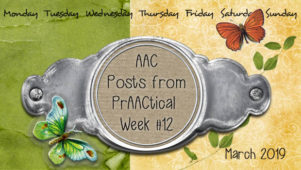
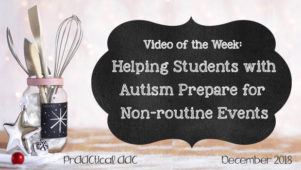
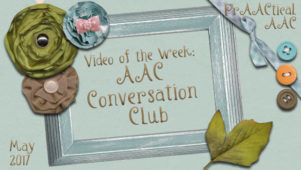
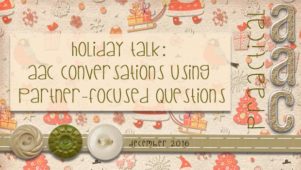
2 Comments
what app do you reccomend for this book making there are so many bad ones out there! Thanks!
Liz, there are lots out there but one that we use quite a bit is Pictello.